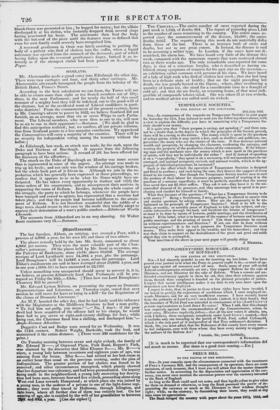SCOTLAND.
Mr. Abercrombie made a grand entry into Edinburgh the other day. There were two carriages and four, and thirty other carriages. Mr. Abercrombie afterwards harangued the people from the balcony of the British Hotel, Prince's Street.
According to the best calculation we can form, the Tories will not be able to return more than eight or ten Scotch members out of fifty- three, in the next Parliament ; and for nearly the half of this small remnant of a mighty host they will be indebted, not to the good-will of the electors, but to the accidental want of Liberal candidates in parti- cular districts ! From the commencement of the present century, down to Mr. Canning's advent to power in 1822, we believe Scotland did not furnish, on an average, more than six or seven Whigs to each Parlia- ment. The Liberal members, who were then as one to six, will now be as six to one to their opponents !—Scotsman. [We shall be glad to And this anticipation realized ; but, we confess, all our private informa- tion from Scotland points to a less sanguine conclusion. We apprehend the Conservatives will carry a majority of the counties. There will be no security for independent voting among the tenantry without the ballot.] At Edinburgh, last week, an attack was made, by the mob, upon the Duke and Duchess of Buccleugh. It appears from the following paragraph to have been serious. A reward of 50/. has been offered for the discovery of the offenders—
The attack on the Duke of Buceleugh on Monday was more severe than is represented in some of the papers. An attempt was made to trip up his heels ; and not only was the window of his carriage broken, but the whole back part of it driven in. Although we join in the re- probation which has generally been expressed at these proceedings, we confess that it appears to us to be what his Grace might have an- ticipated. He has taken every opportunity to traduce and vilify the lower orders of his countrymen, and to misrepresent their motives in supporting the cause of Reform. Besides, during the whole course of the struggle, the party to which he belongs, whenever the people have been tranquil and ceased to agitate, has represented that a reaction had taken place, and that the people had become indifferent to the attain- ment of Reform. It is not therefore wonderful that the rabble of a large town should resort in this case to the mode they usually adopt to express their detestation of a Man's public conduct. —Edinburgh Weekly Chronicle.
The accounts from Abbotsford are in no way cheering. Sir Walter Scott continues very ill.—Scotsman.



























 Previous page
Previous page